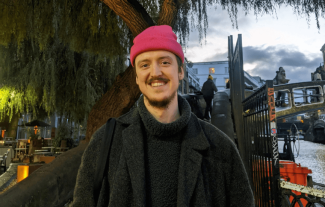
Together, we can proudly find our way to our authentic selves

Thomas Parkinson only realised he stammered when he was 18 and went looking for a cure. Here he tells us how therapists and meeting others helped him view his stammer in a much more positive light.
It is difficult, sometimes even impossible, to convey to someone who doesn't stammer what it is like to try to speak and be unable to do so. You shape your mouth to produce a sound, but nothing comes out. You are stopped in your tracks before you've even begun. You are failed by the one thing that you are sure you can rely on: your body — yourself. You, alone, are frozen in time. By some mysterious neurological process, you've instructed your voice to project itself and it hasn't. For whatever reason, you've lost the power of speech. "Why? How? Where has my voice gone?"
I still refused to put a name to my stammer.
In the process of coming to terms with my speech, I never actually asked myself those questions. I didn't want to; I just pretended that I could speak like everybody else, that I was fluent, 'normal' — that I'd eventually 'grow out of it'. But I never did. It stuck, and I left school at eighteen with the awful feeling that what I'd experienced since I was a child would in all likelihood remain with me for the rest of my life. And even though I had begun to accept my fate, I still refused to put a name to my stammer. I was a serial 'avoider' which meant that I never repeated sounds, I just avoided saying problem words or I would pick a different word altogether, even if it didn't fit my intended meaning. I would shift clumsily around my limited vocabulary and wilfully distort what I really wanted to say to my own frustration and to the confusion of others around me. But because my understanding of stammered speech was so confused, I made myself believe that I didn't have one.
It took a particularly excruciating social interaction to finally press me into doing what I'd been putting off for years. I googled 'stammering', and I realised within minutes that I had a covert stammer, so I immediately referred myself to a speech and language therapist, most likely with ideas of a 'cure' in mind. I thought, because I was still relatively young, there was still time to 'fix it'. But after only a minute into my first therapy session I knew that I would never be cured because, well, there wasn't one. And, to my surprise, I learned that even if there was then perhaps I wouldn't need or want it.
Accepting my stammered voice
I was fortunate enough to be put under the care of two incredibly kind and thoughtful NHS therapists who taught me how to accept my stammered voice for what it was: a part of me that didn't have to change. After only a handful of conversations, what seemed at first like a burden now appeared like a point of pride.
I don't want to give the impression that this change came about overnight — it didn't, and there were times when I was frustrated and even reluctant to view myself as a person who stammered and who always would. But eventually, I began to see that finding the strength to see myself as a disabled speaker would help me discover who I was and who I wanted to be.
Accepting my stammer enabled me to connect with people in a way that I never thought was possible. Interacting with groups of people was always incredibly hard, and I would often be so overcome by anxiety that I'd have to remove myself from a social situation, or sit in silence. When I finally realised what it was that was creating that anxiety, stammering openly felt like unfastening the straitjacket that had long restrained my personality. I learned that by acknowledging my vulnerabilities, I could begin to form the meaningful relationships I'd always craved, and socialising became easy, even enjoyable. Something that was once so daunting was now unimaginably fun.
What seemed at first like a burden now appeared like a point of pride.
Discovering disability pride
Discovering the disability pride — including the stammering pride — movement only added to my new sense of self, and it soothed the bewildering and sometimes difficult process of acceptance. Over time, I began to understand that disability was something to be celebrated, not stigmatised. The incredible work of disability activists has fostered a growing awareness that society should change around disabled people, not the other way around. Speaking to those campaigners and engaging with their work was not only transformative on a personal level, it also revealed to me how disability could encompass the extraordinary beauty of difference.
Having a disability can in reality be upsetting, infuriating, and restrictive, and to constantly live out that difference can be mentally and physically taxing. But there is an increasingly wider recognition of how society actually creates rather than eliminates many of the barriers disabled people face. And if we continue to normalise disabled speech, perhaps we can shed some of the burden of feeling like we are in some way deficient or faulty. Together, we can proudly find our way to our authentic selves.
What do you think? We'd love to hear about your own experiences, or your views on the stammering pride movement. See Submit Something For The Site or email editor@stamma.org for details.
If you've enjoyed reading Thomas' article and have found his experience helpful, please consider making a donation. Donating to STAMMA means that we can carry on sharing Your Voice stories from members of our community which inspire and encourage others on their stammering journeys. Read more inspiring stories.



































